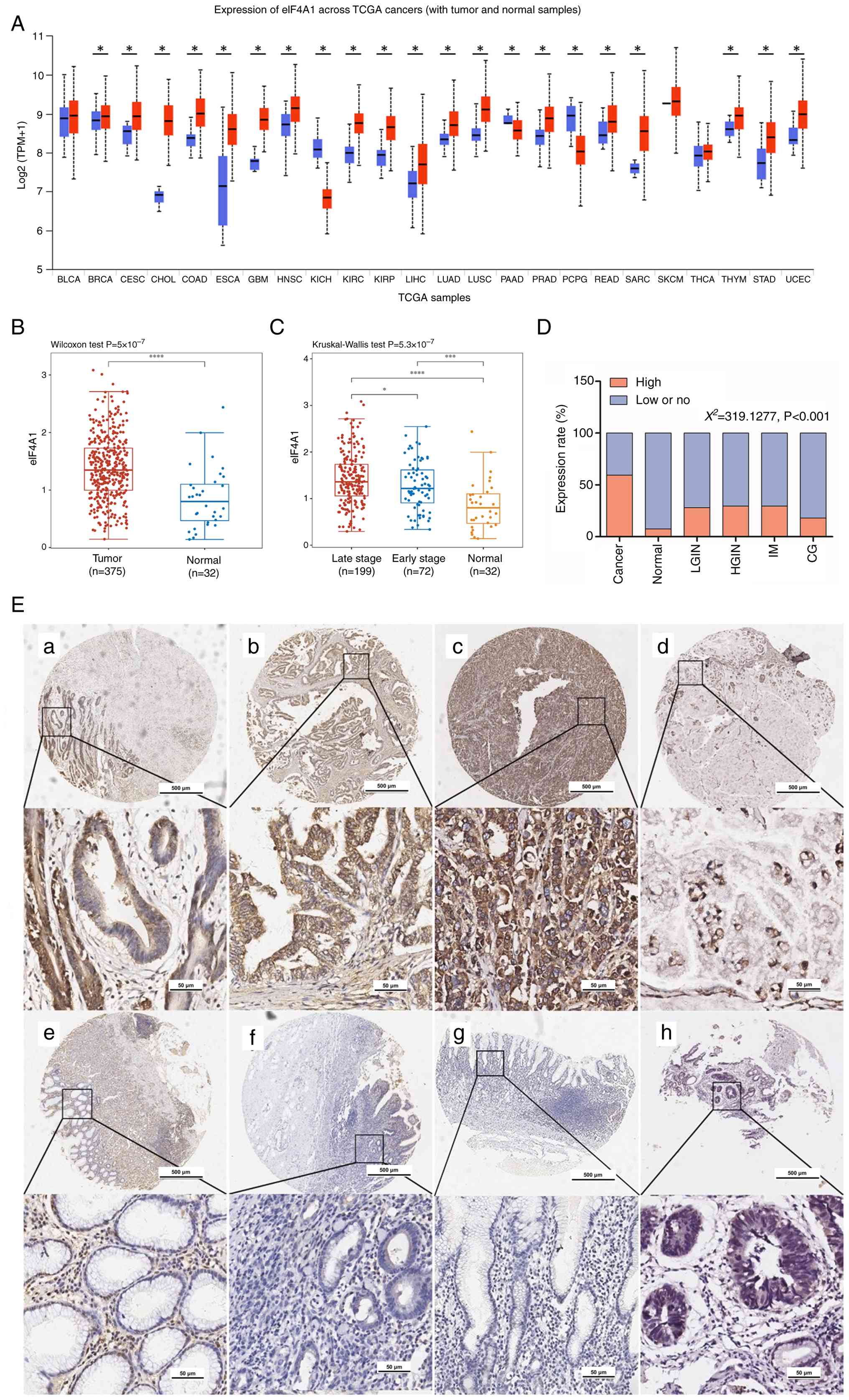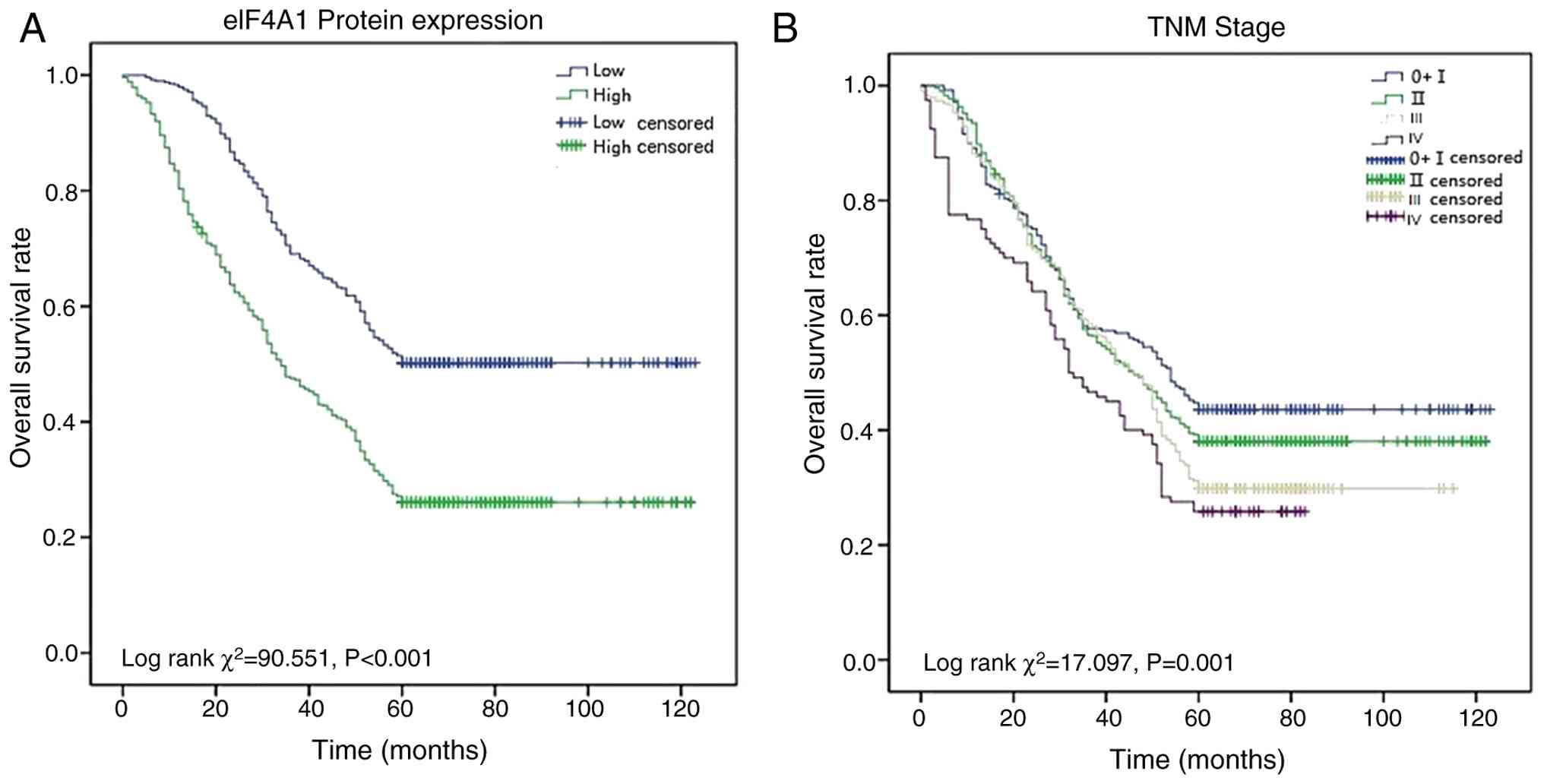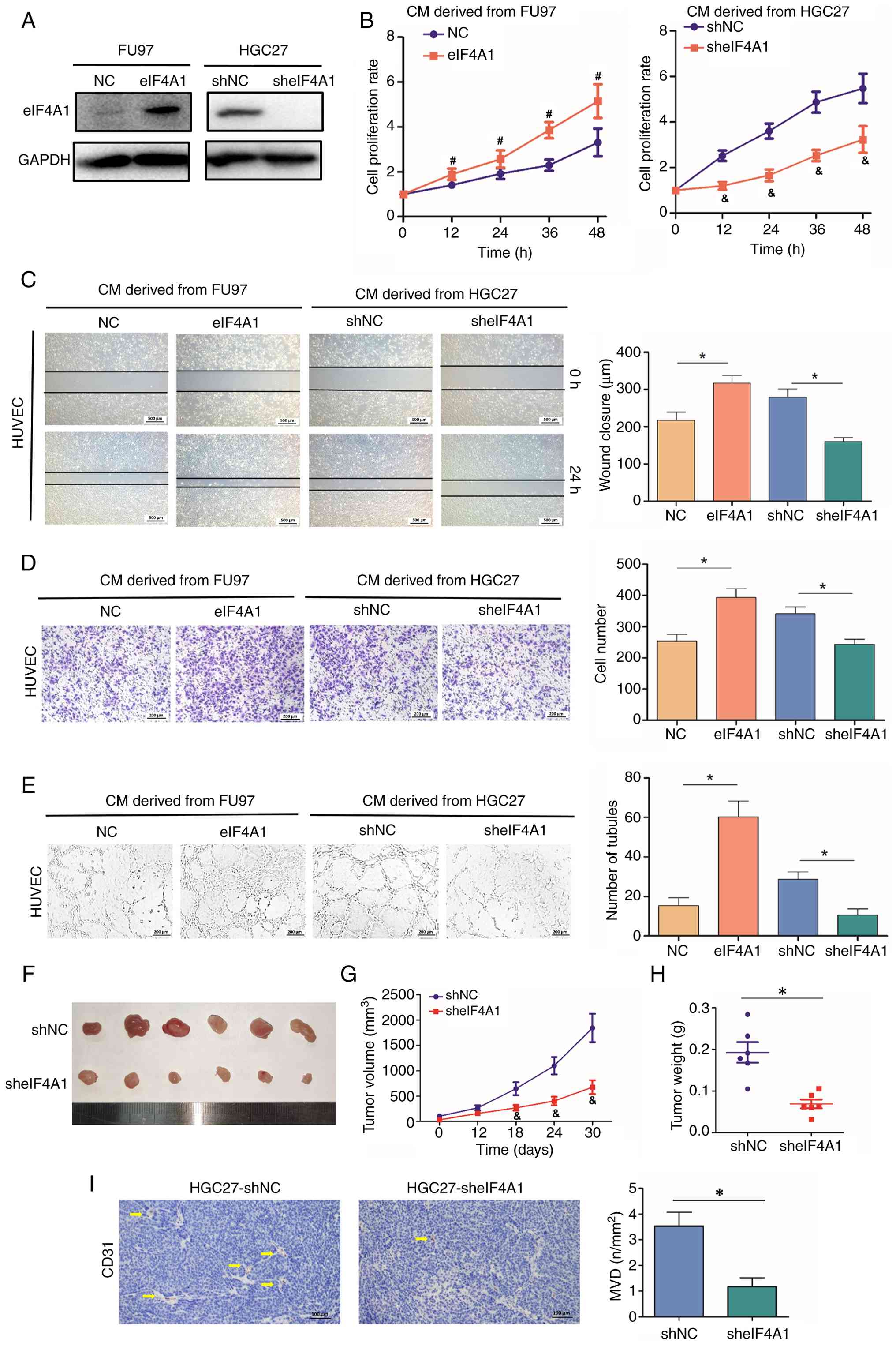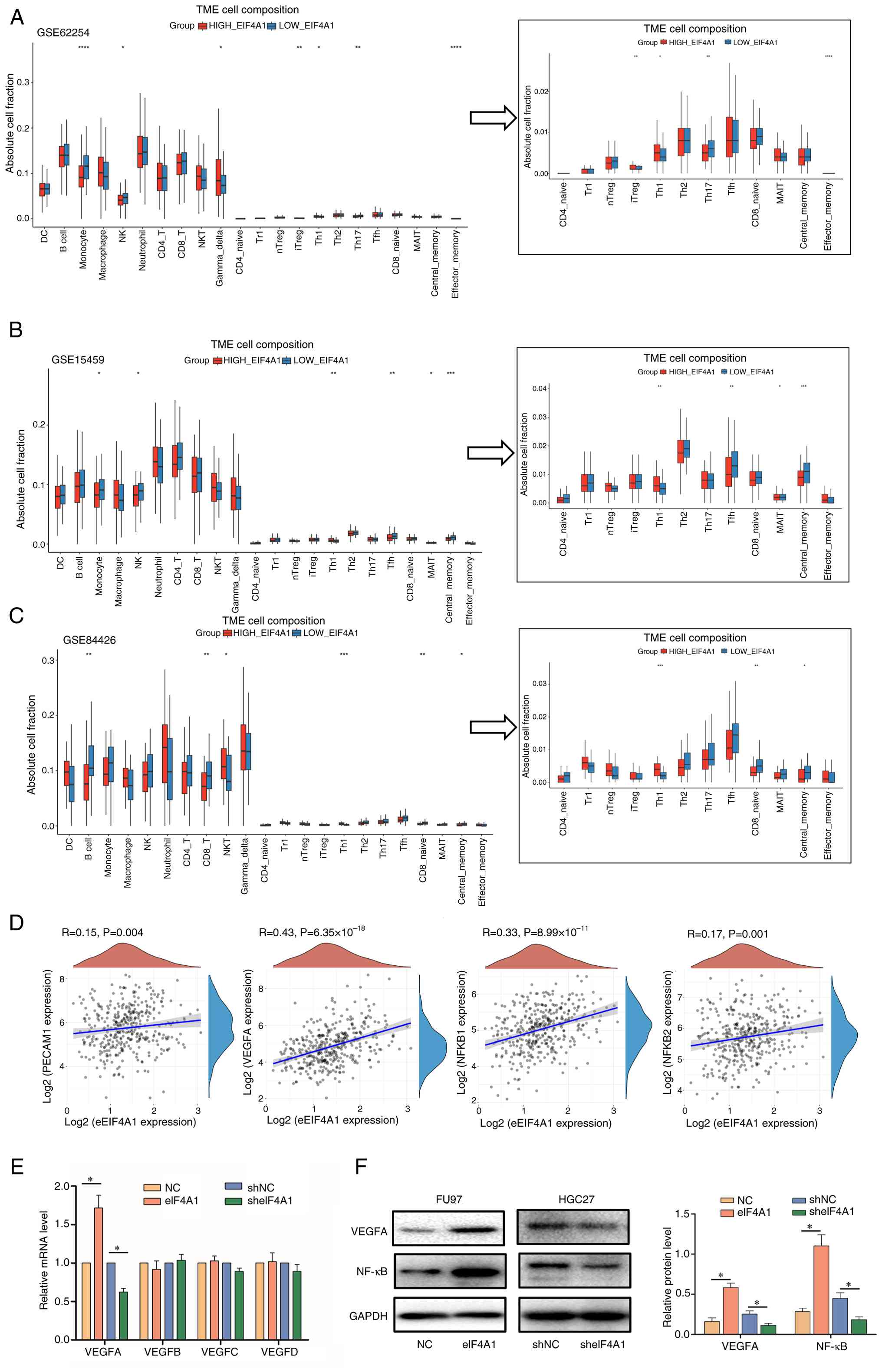|
1
|
Sung H, Ferlay J, Siegel RL, Laversanne M,
Soerjomataram I, Jemal A and Bray F: Global cancer statistics 2020:
GLOBOCAN estimates of incidence and mortality worldwide for 36
cancers in 185 countries. CA Cancer J Clin. 71:209–49.
2021.PubMed/NCBI
|
|
2
|
de Martel C, Georges D, Bray F, Ferlay J
and Clifford GM: Global burden of cancer attributable to infections
in 2018: A worldwide incidence analysis. Lancet Glob Health.
8:e180–e190. 2020. View Article : Google Scholar : PubMed/NCBI
|
|
3
|
Li ZY, Liu K and Zhang WH: Epidemiologic
features and trends of gastric cancer in the world and
China:interpretation of the GLOBOCAN 2018–2022. Chin J Bases Clin
Gen Surg. 31:1236–1245. 2024.https://www.gensurg.cn/article/10.7507/1007-9424.202409074
|
|
4
|
Kuai X, Jia L, Yang T, Huang X, Zhao W,
Zhang M, Chen Y, Zhu J, Feng Z and Tang Q: Trop2 promotes multidrug
resistance by regulating notch1 signaling pathway in gastric cancer
cells. Med Sci Monit. 26:e9195662020. View Article : Google Scholar : PubMed/NCBI
|
|
5
|
Jungers CF, Elliff JM, Masson-Meyers DS,
Phiel CJ and Origanti S: Regulation of eukaryotic translation
initiation factor 6 dynamics through multisite phosphorylation by
GSK3. J Biol Chem. 295:12796–12813. 2020. View Article : Google Scholar : PubMed/NCBI
|
|
6
|
Raza F, Waldron JA and Quesne JL:
Translational dysregulation in cancer: eIF4A isoforms and sequence
determinants of eIF4A dependence. Biochem Soc Trans. 43:1227–1233.
2015. View Article : Google Scholar : PubMed/NCBI
|
|
7
|
Lu W, Wilczynska A, Smith E and Bushell M:
The diverse roles of the eIF4A family: You are the company you
keep. Biochem Soc Trans. 42:166–172. 2014. View Article : Google Scholar : PubMed/NCBI
|
|
8
|
Galicia-Vázquez G, Cencic R, Robert F,
Agenor AQ and Pelletier J: A cellular response linking eIF4AI
activity to eIF4AII transcription. RNA. 18:1373–1384. 2012.
View Article : Google Scholar : PubMed/NCBI
|
|
9
|
Williams-Hill DM, Duncan RF, Nielsen PJ
and Tahara SM: Differential expression of the murine eukaryotic
translation initiation factor isogenes eIF4A(I) and eIF4A(II) is
dependent upon cellular growth status. Arch Biochem Biophys.
338:111–120. 1997. View Article : Google Scholar : PubMed/NCBI
|
|
10
|
Fang D, Peng J, Wang G, Zhou D and Geng X:
Upregulation of eukaryotic translation initiation factor 4E
associates with a poor prognosis in gallbladder cancer and promotes
cell proliferation in vitro and in vivo. Int J Mol Med.
44:1325–1332. 2019.PubMed/NCBI
|
|
11
|
Horvilleur E, Sbarrato T, Hill K, Spriggs
RV, Screen M, Goodrem PJ, Sawicka K, Chaplin LC, Touriol C, Packham
G, et al: A role for eukaryotic initiation factor 4B overexpression
in the pathogenesis of diffuse large B-cell lymphoma. Leukemia.
28:1092–1102. 2014. View Article : Google Scholar : PubMed/NCBI
|
|
12
|
Wolfe AL, Singh K, Zhong Y, Drewe P,
Rajasekhar VK, Sanghvi VR, Mavrakis KJ, Jiang M, Roderick JE, Van
der Meulen J, et al: RNA G-quadruplexes cause eIF4A-dependent
oncogene translation in cancer. Nature. 513:65–70. 2014. View Article : Google Scholar : PubMed/NCBI
|
|
13
|
Wiegering A, Uthe FW, Jamieson T, Ruoss Y,
Hüttenrauch M, Küspert M, Pfann C, Nixon C, Herold S, Walz S, et
al: Targeting translation initiation bypasses signaling crosstalk
mechanisms that maintain high MYC levels in colorectal cancer.
Cancer Discov. 5:768–781. 2015. View Article : Google Scholar : PubMed/NCBI
|
|
14
|
Tsumuraya T, Ishikawa C, Machijima Y,
Nakachi S, Senba M, Tanaka J and Mori N: Effects of hippuristanol,
an inhibitor of eIF4A, on adult T-cell leukemia. Biochem Pharmacol.
81:713–722. 2011. View Article : Google Scholar : PubMed/NCBI
|
|
15
|
Wu YT, Xin L, Lu LJ, Gan L, Dai W, Shi YL,
Adhikari VP, Wu KN and Kong LQ: Effect of neoadjuvant chemotherapy
on the expression of hormone receptors and Ki-67 in Chinese breast
cancer patients: A retrospective study of 525 patients. J Biomed
Res. 32:191–197. 2017.(Epub ahead of print). PubMed/NCBI
|
|
16
|
Cristescu R, Lee J, Nebozhyn M, Kim KM,
Ting JC, Wong SS, Liu J, Yue YG, Wang J, Yu K, et al: Molecular
analysis of gastric cancer identifies subtypes associated with
distinct clinical outcomes. Nat Med. 21:449–456. 2015. View Article : Google Scholar : PubMed/NCBI
|
|
17
|
Ooi CH, Ivanova T, Wu J, Lee M, Tan IB,
Tao J, Ward L, Koo JH, Gopalakrishnan V, Zhu Y, et al: Oncogenic
pathway combinations predict clinical prognosis in gastric cancer.
PLoS Genet. 5:e10006762009. View Article : Google Scholar : PubMed/NCBI
|
|
18
|
Yoon SJ, Park J, Shin Y, Choi Y, Park SW,
Kang SG, Son HY and Huh YM: Deconvolution of diffuse gastric cancer
and the suppression of CD34 on the BALB/c nude mice model. BMC
Cancer. 20:3142020. View Article : Google Scholar : PubMed/NCBI
|
|
19
|
Livak KJ and Schmittgen TD: Analysis of
relative gene expression data using real-time quantitative PCR and
the 2(−Delta Delta C(T)) method. Methods. 25:402–408. 2001.
View Article : Google Scholar : PubMed/NCBI
|
|
20
|
Gao C, Guo X, Xue A, Ruan Y, Wang H and
Gao X: High intratumoral expression of eIF4A1 promotes
epithelial-to-mesenchymal transition and predicts unfavorable
prognosis in gastric cancer. Acta Biochim Biophys Sin (Shanghai).
52:310–319. 2020. View Article : Google Scholar : PubMed/NCBI
|
|
21
|
Huang C, Li H, Xu Y, Xu C, Sun H, Li Z, Ge
Y, Wang H, Zhao T, Gao S, et al: BICC1 drives pancreatic cancer
progression by inducing VEGF-independent angiogenesis. Signal
Transduct Target Ther. 8:3794–3805. 2023.PubMed/NCBI
|
|
22
|
García-García C, Frieda KL, Feoktistova K,
Fraser CS and Block SM: RNA BIOCHEMISTRY. Factor-dependent
processivity in human eIF4A DEAD-box helicase. Science.
348:1486–1488. 2015. View Article : Google Scholar : PubMed/NCBI
|
|
23
|
Fu XD: RNA helicases regulate RNA
condensates. Cell Res. 30:281–282. 2020. View Article : Google Scholar : PubMed/NCBI
|
|
24
|
Modelska A, Turro E, Russell R, Beaton J,
Sbarrato T, Spriggs K, Miller J, Gräf S, Provenzano E, Blows F, et
al: The malignant phenotype in breast cancer is driven by
eIF4A1-mediated changes in the translational landscape. Cell Death
Dis. 6:e16032015. View Article : Google Scholar : PubMed/NCBI
|
|
25
|
Jin C, Rajabi H, Rodrigo CM, Porco JA Jr
and Kufe D: Targeting the eIF4A RNA helicase blocks translation of
the MUC1-C oncoprotein. Oncogene. 32:2179–2188. 2013. View Article : Google Scholar : PubMed/NCBI
|
|
26
|
Cencic R, Robert F, Galicia-Vázquez G,
Malina A, Ravindar K, Somaiah R, Pierre P, Tanaka J, Deslongchamps
P and Pelletier J: Modifying chemotherapy response by targeted
inhibition of eukaryotic initiation factor 4A. Blood Cancer J.
3:e1282013. View Article : Google Scholar : PubMed/NCBI
|
|
27
|
Zhao W, Zhu H, Zhang S, Yong H, Wang W,
Zhou Y, Wang B, Wen J, Qiu Z, Ding G, et al: Trop2 is overexpressed
in gastric cancer and predicts poor prognosis. Oncotarget.
7:6136–6145. 2016. View Article : Google Scholar : PubMed/NCBI
|
|
28
|
Cui JX, Xu XH, He T, Liu JJ, Xie TY, Tian
W and Liu JY: L-kynurenine induces NK cell loss in gastric cancer
microenvironment via promoting ferroptosis. J Exp Clin Cancer Res.
42:522023. View Article : Google Scholar : PubMed/NCBI
|
|
29
|
Choo J, Kua LF, Soe MY, Asuncion BR, Tan
BKJ, Teo CB, Tay RYK, So J, Shabbir A, Guowei K, et al: Clinical
relevance of PD-1 positive CD8 T-cells in gastric cancer. Gastric
Cancer. 26:393–404. 2023. View Article : Google Scholar : PubMed/NCBI
|
|
30
|
Lundberg A, Li B and Li R: B cell-related
gene signature and cancer immunotherapy response. Br J Cancer.
126:899–906. 2022. View Article : Google Scholar : PubMed/NCBI
|
|
31
|
Qu Y, Wang X, Bai S, Niu L, Zhao G, Yao Y,
Li B and Li H: The effects of TNF-α/TNFR2 in regulatory T cells on
the microenvironment and progression of gastric cancer. Int J
Cancer. 150:1373–1391. 2022. View Article : Google Scholar : PubMed/NCBI
|
|
32
|
Su H, Jin Y, Tao C, et al: Th2 cells
infiltrating high-grade serous ovarian cancer: a feature that may
account for the poor prognosis. J Gynecol Oncol. 34:e482023.
View Article : Google Scholar : PubMed/NCBI
|
|
33
|
Hsieh HL and Tsai MM: Tumor
progression-dependent angiogenesis in gastric cancer and its
potential application. World J Gastrointest Oncol. 11:686–704.
2019. View Article : Google Scholar : PubMed/NCBI
|
|
34
|
Fane ME, Ecker BL, Kaur A, Marino GE,
Alicea GM, Douglass SM, Chhabra Y, Webster MR, Marshall A, Colling
R, et al: sFRP2 supersedes VEGF as an age-related driver of
angiogenesis in melanoma, affecting response to anti-VEGF therapy
in older patients. Clin Cancer Res. 26:5709–5719. 2020. View Article : Google Scholar : PubMed/NCBI
|
|
35
|
Wei W, Cao W, Zhan Z, Yan L, Xie Y and
Xiao Q: MiR-1284 suppresses gastric cancer progression by targeting
EIF4A1. Onco Targets Ther. 12:3965–3976. 2019. View Article : Google Scholar : PubMed/NCBI
|
|
36
|
Ghalehbandi S, Yuzugulen J, Pranjol MZI
and Pourgholami MH: The role of VEGF in cancer-induced angiogenesis
and research progress of drugs targeting VEGF. Eur J Pharmacol.
949:1755862023. View Article : Google Scholar : PubMed/NCBI
|
|
37
|
Patel SA, Nilsson MB, Le X, Cascone T,
Jain RK and Heymach JV: Molecular mechanisms and future
implications of VEGF/VEGFR in cancer therapy. Clin Cancer Res.
29:30–39. 2023. View Article : Google Scholar : PubMed/NCBI
|
|
38
|
Jiang Y, Huang J, Huang Z, Li W, Tan R, Li
T, Chen Z, Tang X, Zhao Y, Qiu J, et al: ADAMTS12 promotes
oxaliplatin chemoresistance and angiogenesis in gastric cancer
through VEGF upregulation. Cell Signal. 111:1108662023. View Article : Google Scholar : PubMed/NCBI
|
|
39
|
Wang R, Ma Y, Zhan S, Zhang G, Cao L,
Zhang X, Shi T and Chen W: B7-H3 promotes colorectal cancer
angiogenesis through activating the NF-κB pathway to induce VEGFA
expression. Cell Death Dis. 11:552020. View Article : Google Scholar : PubMed/NCBI
|
|
40
|
Mantsounga CS, Lee C, Neverson J, Sharma
S, Healy A, Berus JM, Parry C, Ceneri NM, López-Giráldez F, Chun
HJ, et al: Macrophage IL-1β promotes arteriogenesis by autocrine
STAT3- and NF-κB-mediated transcription of pro-angiogenic VEGF-A.
Cell Rep. 38:1103092022. View Article : Google Scholar : PubMed/NCBI
|
|
41
|
Li F and Zhu W: LINC00460 promotes
angiogenesis by enhancing NF-κB-mediated VEGFA expression in
cervical cancer cells. Biochem Biophys Res Commun. 671:146–152.
2023. View Article : Google Scholar : PubMed/NCBI
|














